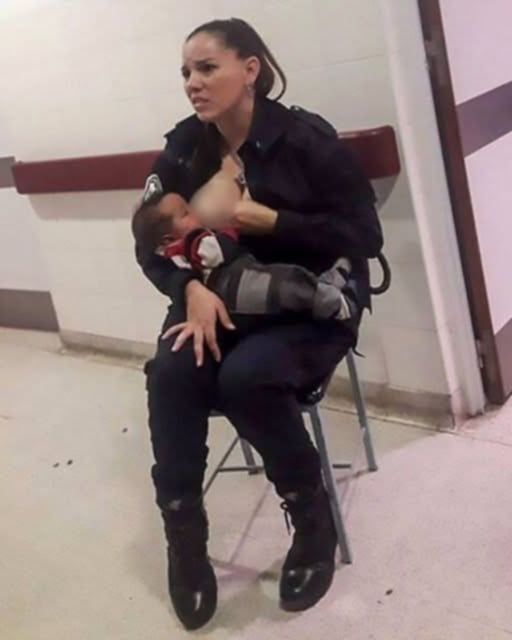It started as just another routine shift—patrolling streets, answering calls. But no amount of training prepares you for the moments that change your life forever. We were called to a hospital where a woman had been seen wandering in distress. By the time we arrived, she was gone. What she left behind wasn’t just concerning—it was heartbreaking. A newborn baby, wrapped in tattered cloth, lay alone near the emergency room. His cries were faint and tired, his little body thin and trembling. A nurse told us he hadn’t stopped wailing in hours. No food, no family, no name.
Something inside me broke. I had a child of my own, and that cry hit me like a punch to the chest. I scooped the baby into my arms without thinking. I adjusted my uniform, found a quiet spot, and held him close. He calmed almost immediately, clutching my vest with tiny fingers. Around me, people stopped to watch—nurses, officers, patients—but I didn’t care. This child needed comfort, and in that moment, I became the only person who could give it.
No one came to claim him. Days passed. Then weeks. Social services called him Oliver. It suited him. He had wide, curious eyes that scanned the world with quiet wisdom. I started visiting regularly—first out of duty, then out of something deeper. I wasn’t just an officer checking on a case. I was someone who cared. Oliver responded with warmth that surprised everyone. He never cried when I held him. He simply melted into me, as if he knew I wasn’t going anywhere.
At home, my wife noticed the shift in me. “You’ve been spending a lot of time at the hospital,” she said gently as we folded laundry, our daughter Mia playing nearby. I told her it was just part of the job. The truth was more complicated. I couldn’t stop thinking about him—this little boy left behind with nothing. I saw pieces of Mia in his tiny face, his laugh, his fight to be seen.
One night, after a long shift, I dropped by the nursery again. It was late. The room glowed dimly under a crescent moon nightlight. Oliver lay awake but calm. When he saw me, he smiled. My heart squeezed. I picked him up, and as I held him, I felt the tears welling up—tears I hadn’t expected. I blinked them back. That’s when I noticed her in the doorway.
She was young, exhausted, and clearly scared. Her voice trembled. “Is… is that my son?”
Her name was Elena. Her story unraveled in fragments—homeless, unemployed, overwhelmed. Oliver had been born premature, and without the resources to care for him, she had left him at the hospital in desperation. She thought someone might give him a better chance than she ever could. Her words were drenched in guilt. “I thought he’d die because of me. I didn’t want to watch that happen.”
I listened quietly. I understood more than I let on. Parenthood under normal conditions is hard—under hers, it was nearly impossible. She asked me what would happen next. I told her the truth: regaining custody wouldn’t be easy, but it was possible. Social services could help—if she was willing to fight.
And she was. Over the next few months, Elena worked like someone possessed. With support from counselors, local programs, and shelters, she found stable housing, a job, and a sense of purpose. Oliver stayed in foster care, but every step Elena took brought her closer to being the mother she wanted to be.
I kept visiting Oliver. I read him stories, brought him toys, sang lullabies until he giggled himself into hiccups. I knew he wouldn’t be mine forever, but I also knew he was growing strong—and soon, he’d go home.
The day of the custody hearing, I stood outside the courtroom as Elena wrapped her arms around Oliver, weeping into his hair. I watched quietly, proud of them both. Later, she hugged me and whispered, “You saved us.” I shook my head. “No. You saved him. You just needed someone to believe you could.”
Months went by. Life returned to its usual rhythm. Then, one morning, there was a knock at the door. It was Elena—with Oliver holding her hand. He broke into a run the moment he saw me, launching himself into my arms. Elena handed me a small canvas bag. Inside was a quilt—stitched by hand with stars, moons, and footprints. On the back, in soft cursive, were the words: “Thank you for being our guiding light.”
I couldn’t speak. My wife joined me at the door, wrapping her arms around my waist as we watched Oliver play with Mia on the living room rug. He was strong now. Safe. Loved. That little boy I had found abandoned in the cold now had a future—because someone showed up and chose not to walk away.
Being a good officer isn’t just about arresting criminals. Sometimes, it’s about sitting quietly with a child who has no one. It’s about listening when no one else does. It’s about believing that broken stories can be rewritten. And if we all choose to care, even just a little more, we might just change lives in ways we never imagined.
